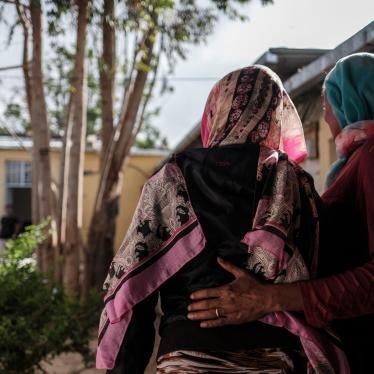For 16 months, in an often hidden and ignored armed conflict in northern Ethiopia, warring parties have doubly victimized women and girls, subjecting them to widespread, horrific acts of sexual violence and then deliberately obstructing their access to care. International Women’s Day, March 8, is an important time to reflect on the plight of these women and girls and ending it.
In the Tigray region, where the conflict broke out in November 2020, Ethiopian federal and allied forces, including Eritrean government and Amhara forces, subjected Tigrayan women and girls to sexual violence, and deliberately attacked healthcare facilities. Tigrayan militia also raped Eritrean refugees.
When the conflict spread to the Amhara region in July 2021, women and girls raped by Tigrayan forces struggled to receive care in areas under those forces’ control. Civilians described a public health system in tatters due to fighting, looting, and the flight of medical personnel.
Since late June 2021, the Ethiopian government has effectively besieged Tigray, largely blocking aid including food, medical supplies, and fuel from entering the region, while maintaining a blanket shutdown of banking, telecommunications, and electricity.
Without needed humanitarian assistance, survivors of sexual violence and those trying to help them have been left reeling. Survivors are denied access to critical medical and psychosocial care, while being forced to confront shortages of food and restrictions on other key services needed to rebuild their lives.
Instead of expanding operations to deliver desperately needed support to survivors, aid agencies have been forced to downsize or halt operations because of the denial of humanitarian access. “Without cash and fuel, it’s really difficult to reach the people in need,” was a refrain we repeatedly heard from service providers in late 2021.
The Ethiopian government and regional authorities should end their effective siege on the civilian population in Tigray and, with international support, facilitate the scaling up of a robust, principled humanitarian response throughout northern Ethiopia.
All warring parties in Ethiopia should take action to end abuses by their forces, including rape and other sexual violence against women and girls.
International Women’s Day is just one reason why today, Ethiopia’s international and regional partners should be clear that humanitarian access is not a political bargaining chip, but a legal obligation. Concrete measures need to be taken against those hampering aid to inflict harm.








